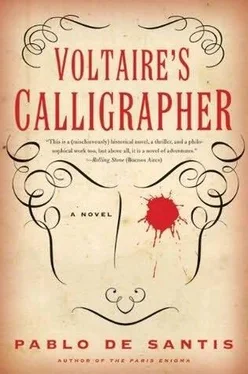There was something odd about the way almost everyone dressed that made them look foreign-except the foreigners, who tried to look Parisian. Everyone came down the stairs silent and alone but soon began animated conversations with one another and occasionally with the models. They boasted of their latest assignments: a cameo barely whispered, a virgin for a chapel exclaimed, the portrait of a certain countess bellowed. Those with money would soon come to an arrangement and leave with the chosen model; the others, outdone, would quietly criticize the women who were now beginning to dress.
“I need a model who’s not too imposing. She needs to be more of an outline; she should lack a little definition,” said one who looked extremely young, almost a boy, dressed in every piece of clothing he could find.
“You want a model who’s a little blurry, like when you’re drunk? Well, that’s easy enough to achieve, my young Arsit!” said his friend, a tall man with enormous hands who was surreptitiously sketching as he talked. He was using the girls without having to pay a cent, but his hands were so big it was impossible not to notice. “Look at that one, with the red hair; she’s perfect for a Gorgon.”
“They were better fed last year, Gravelot.”
“You weren’t even born last year.”
Arsit ignored him and tried to deepen his voice:
“They don’t know how to be still. Do you see them moving, Gravelot? What would Mattioli say if he were here.”
I asked who Mattioli was.
“Guido Mattioli, the sculptor. You haven’t heard of him? Where are you from?” the boy asked in disbelief. “You should read his book The Life of Statues instead of freezing to death here. Until you have, you won’t understand a thing about models. Mattioli is extremely demanding when it comes to choosing his muses: he won’t tolerate the slightest movement.”
“To test them, he smears their breasts in honey and releases a swarm of bees: a real model must be able to remain indifferent,” Gravelot said, still drawing. The women who were left had now recognized his strategy and were hurriedly dressing.
“Before working on a sculpture, the model herself must be a statue,” Arsit explained. “In his book, Mattioli says: you must wrest the statue that’s in the woman to then wrest the woman hiding inside the marble.”
“Where can I find Mattioli?” I asked.
“Do you want him to teach you? He doesn’t take students.”
The boy painter smiled arrogantly. He liked knowing what others didn’t.
“I’d be happy just to watch him work.”
“I’ve never seen him, but they say he lives in a house at the end of rue des Cendres. Every now and then an outing is organized: the artists all file out of here on foot, watch him work through a window-never daring to knock on his door-and then they all leave. How many times have you gone to see him, Gravelot?”
“Three. The first time, Mattioli threw water at us; the second, rocks; and the third, a dead rat.”
“And you, Arsit? Haven’t you ever wanted to see him with your own eyes?”
“Let me offer you a piece of advice,” the boy painter replied gravely. “Keep your ideals where they are, just out of reach.”
We were the last ones there. Gravelot, with his enormous hands and feet, clomped up the stairs. Arsit stayed behind.
“What about you? Aren’t you coming?” I asked.
He didn’t reply, just turned his head and disappeared between a lion and a virgin with outstretched hands.
Gravelot took me by the arm.
“Leave him be. Arsit lives here. He was abandoned as a child and grew up among these statues. He rarely comes to the surface. Sometimes I bring him a plate of food and leave it on the stairs, as if he were a stray cat. Every Tuesday I shake as I come into the basement, worried I’ll find him as frozen as everything around him. He’s never painted or sculpted a thing, but he lives for art.”
Outside that world of statues, Paris was still very much alive. The streets were full of passersby who constantly changed direction, as if suddenly remembering something they had to do; the trees rustled even though there was no wind; not even the houses were still but shook with the passing of cars. And yet, as I approached rue des Cendres (so named because of a brick factory that used to blanket the street in ash), there were fewer people, and everything turned gray, still, and empty. I passed a dead beggar and a sleeping horse. Mattioli’s house, at the end of the street, was like something from a dream, the kind of house you only ever see from the outside because the moment you knock, you startle awake.
I found a window at street level and stretched out on the cobblestones. Through the dirty glass, I could see into Mattioli’s studio. His tools were on the floor; there was a folding screen at the back. Sketches of the model multiplied her figure countless times. The sculptor was working on a block of marble he had already transformed into the shadow of a woman.
Clarissa was off to one side: naked, white, perfect-more perfect even than the distant copy her father had made. She was gripping a gold helmet and a lance that rested on the floor beside her. She sat so still that, in contrast, the other Clarissa, the one born out of marble, seemed to be alive.
Von Knepper was leaning over a delicate mechanism that resembled a musical instrument: glass pegs tightened very fine strings that would make a sound at the slightest touch.
“We need to find another way to make automatons talk. The human vocal system is extremely difficult to control. The slightest imperfection and the melody of the inanimate starts to play. One day I’ll resort to magic. I once read that Hermes Trismegistus could make a statue so perfect that life was inevitable.”
“A statue that comes to life must also then die.”
“Maybe the Egyptian sorcerers watched theirs weaken and expire and abandoned the method forever. Who knows, maybe their creatures reverted to statues, only this time they were abominable, or maybe they shattered into piles of marble shards.”
I picked up a hand that was on the table and tested it. The bones were made of black wood and the joints of gold.
“I found Clarissa,” I said nonchalantly.
Von Knepper’s hands leaped to my neck and he repeated his daughter’s name, as if it were a threat. He squeezed my throat with professional rigor. I fought in vain for the air that would allow me to speak. In the midst of our struggle, we fell on the table. The tiny harp-future throat-fell to the floor, making a strange sound, like an animal cry. Heeding this plea, Von Knepper released me. I backed into a corner of the room.
“I don’t have her, but I know where she is. I saw her myself. I’ll take her somewhere safe today.”
“And do you think I’m going to just wait here, doing nothing, while you…?”
“You won’t be doing nothing. I have a job for you.”
I pulled a ball of paper from my pocket. The documents that change a country’s history, the secrets that send some to the throne and others to the gallows, aren’t safely tucked in folders and covered in wax seals. They’re wrinkled sheets of paper, dampened by the rain, that some insignificant person carries deep in his pocket, with coins, a penknife, and a bit of bread.
“This is the text the bishop is to write. Three envoys from Rome will be meeting with him the day after tomorrow.”
“Yes, I know about that meeting. I was told to make the final adjustments.”
“Those adjustments are written here.”
He read the page.
“You’re crazy. If the bishop writes this, his skull will become an inkwell and my blood the ink.”
“I understand the danger, but there’s no other way for you to see your daughter again.”
Читать дальше
Конец ознакомительного отрывка
Купить книгу












